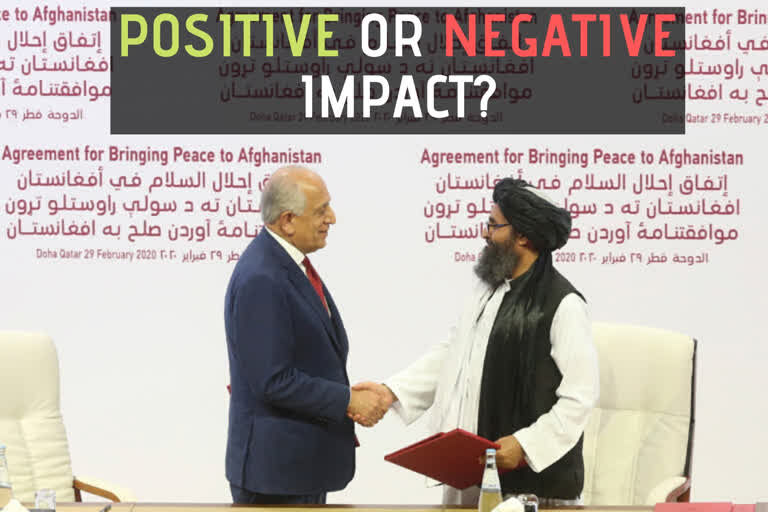New Delhi: In a potentially significant initiative that could have a long term impact on regional security and stability, the US and the Afghan Taliban signed a peace agreement in Doha, Qatar on Saturday (February 29). Whether this impact will be positive or negative remains moot and fuzzy for now, particularly in relation to the implications for India.
This nascent agreement seeks to put an end to the post 9/11 violence and terrorism that has devastated Afghanistan for two almost decades and paves the way for US-led foreign troops to be withdrawn from the war-ravaged nation. However, the manner in which this agreement has been cobbled indicates that it is imbalanced and prioritizes the current US interest – which is linked to the electoral compulsions of US President Donald Trump.
The preamble for this 'deal' is instructive and points to the political fragility inherent in the process, for it notes that the USA has entered into an agreement with an entity it does not formally recognize – the Afghan Taliban. Thus the formal document reads that this is an "Agreement for Bringing Peace to Afghanistan between the Islamic Emirate of Afghanistan which is not recognized by the United States as a state and is known as the Taliban and the United States of America February 29, 2020."
The core of the peace agreement is that the Taliban "Will prevent the use of the soil of Afghanistan by any group or individual against the security of the United States and its allies" and in return the USA "Guarantees, enforcement mechanisms, and announcement of a timeline for the withdrawal of all foreign forces from Afghanistan."
Read:US-Taliban peace deal didn't come as a surprise for us: S Jaishankar
In a complex and long drawn out negotiation process, the USA had to deal with an intractable Taliban leadership that did not recognize the democratically elected Afghan government. Hence the agreement does not refer to the democratically elected government headed by President Ashraf Ghani, who has since been re-elected – though this decision is contested by his rival Dr Abdullah Abdullah.
It may be recalled that India had been reluctant to engage with the Taliban since the tumultuous events of September 11, 2001, and has instead supported the strengthening of the democratic process in Afghanistan. Earlier, the Taliban had enabled the hijacking of an Indian civilian aircraft in December 1999 and the release of certain terrorists and this perfidy lies at the heart of India's opposition to the Taliban.
Furthermore, the support accorded to this group by Rawalpindi, the GHQ of the Pakistan army since the Taliban came to prominence in the mid-1990s has introduced a complex Pakistan element in India’s Afghan policy. This has been exacerbated by the American strategic interest in the region that in turn was shaped by the Cold War. The US-USSR rivalry of that period led to the Soviet occupation of Afghanistan and resulted in the rise of the Afghan mujahedin in the 1980s when US President Ronald Reagan was in office.
The people of Afghanistan have paid a very heavy price for the multi-layered jostling among the major powers and their regional allies/partners since 1980. Consequently, India's own interest has been shaped by this US-Soviet completion; the Iran-Saudi religious divide; the Pakistan support to jihadi fervour and now the Chinese investment in the BRI (Belt and Road Initiative) that has brought southern Asia into greater geo-political focus.
